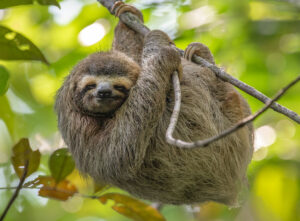Ryan Zavodnick | May 6, 2020 | Pennsylvania Law

NOTE: We only handle cases involving accidents and injuries. This article is for informational purposes only. Information found in the article does not constitute as formal legal advice and does not create an attorney/client relationship. We cannot help you beyond the information provided below if you are interested in getting a pet sloth.
In the past few years, interest in sloths has increased in the United States. Zoos around the country have rushed to add sloths to their animal attractions. Some celebrities have proclaimed their love for these extremely slow-moving animals.
With the intense spotlight on sloths becoming brighter, many people throughout the country have sought to purchase sloths as pets. However, sloths are wild animals. Many states, including Pennsylvania, have laws banning or controlling wild and exotic animals. With the right permit, you may be able to obtain a license to legally own a pet sloth in Pennsylvania.
What is a Sloth?
Sloths are mammals that live in Central and South America. They mostly stay in the tree canopies of the rainforest and only come down about once a week. A sloth can live up to 30 years.
Sloths sleep hanging upside down in the trees for up to 15 to 18 hours a day. They are solitary animals who only have contact with other sloths for mating purposes. While sloths are not lazy, they are incredibly slow-moving and do not like to be touched or held.
A sloth may scratch or bite a person when it is agitated or feels threatened.
Are Sloths Considered Exotic Animals?
The Pennsylvania Game Commission has authority over the ownership of exotic animals in the state. Title 34 of the Pennsylvania Code governs wild game. According to code, “exotic wildlife” includes, but is not limited to, lions, bears, leopards, coyotes, cheetahs, wolves, jaguars, cougars, and tigers.
Even though sloths are not on the list, they could meet the definition of an exotic animal because they are not domesticated. Therefore, it is wise to check with the Pennsylvania Game Commission before purchasing a sloth to determine whether you need a permit to own a sloth in Pennsylvania.
Furthermore, local and county laws might ban or restrict the ownership of a sloth. It is important to check with your local government before purchasing a sloth to ensure that ownership is legal where you live.
How to Obtain A Permit for Possession of an Exotic Animal in Pennsylvania
Pennsylvania does not ban the ownership of exotic or wild animals. It does require that the person have a permit and follow strict rules for the housing and care of an exotic animal.
The Game Commission is authorized to issue permits for the possession of exotic wildlife in Pennsylvania. However, the person must prove that the animal will have adequate and proper care and housing. Also, the Commission must verify that the owner can protect the public from the exotic animal.
The code also prohibits a person from releasing exotic wildlife into the wild and recklessly engaging in conduct that could place other individuals at risk. A person must also exercise due care at all times in safeguarding the public from an attack by exotic wildlife.
Failing to obtain a permit for exotic wildlife in Pennsylvania is a summary offense of the third degree. Other violations of the requirements of the code related to exotic animals are a summary offense of the fifth degree. Furthermore, each day that the person violates the code section is considered a separate offense.
Liability for Damages Caused by Pets
Pet owners in Pennsylvania are liable for the damages caused by their pets. For example, if a dog bites another individual, the dog’s owners may be held liable for damages caused by the dog bite. In some cases, dog owners are liable for damages even though their dog has never bitten another person or attacked another animal.
The same applies to owners of exotic animals. If you own a sloth in Pennsylvania, you are liable if the sloth attacks, bites, or scratches another person. You could be held liable for damages including, but not limited to:
- Medical expenses
- Loss of income
- Therapy
- Physical pain and suffering
- Emotional distress
- Scarring and disfigurement
- Permanent disabilities
The amount of compensation you might owe to another person depends on the facts and circumstances of the case. Additionally, you could be charged with a crime, as discussed above, for failing to protect the public from harm caused by an exotic animal.
What Should You Do if You Are Injured in an Animal Attack?
If a dog, sloth, or other animal attacks you or bites you, seek immediate medical attention. Report the animal bite or attack to the owner and the local animal control agency.
Document your damages by taking photographs of the injuries. Make notes about all conversations you have with the pet owner and the animal control agency. Keep copies of all medical records, reports, and other evidence of financial losses related to the animal attack.
As soon as possible, consult with a personal injury lawyer to discuss your legal rights. An attorney can investigate the case to determine who is liable for your damages.
Contact Our Personal Injury Law Firm in Philadelphia Today To Get Help With Your Case
To learn more and get the help you deserve, call Zavodnick & Lasky Personal Injury Lawyers at (215) 875-7030 or contact us online.
You can also visit our law firm at 123 S Broad St #1220, Philadelphia, PA 19109.
